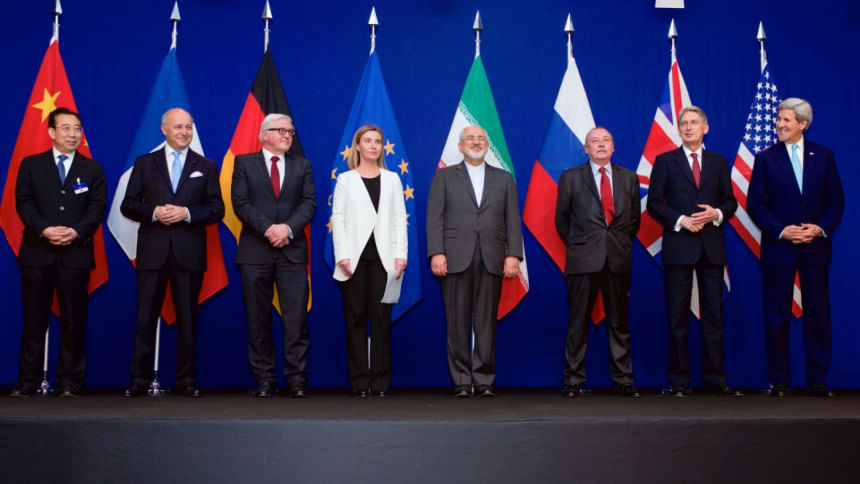Can JCPOA be saved after US pullout?

The 2015 Joint Compr-ehensive Program of Action (JCPOA) was an equation of 6 + 1 = 7. The 6 (P5 + Germany) were the powers that signed the nuclear deal with Iran, i.e. an agreement among 7 parties. After Donald Trump took the US out of the deal on May 8, violating international law, it now reads 5 + 1 = 6. The question is, can these 6 now save the deal? Implementation of JCPOA had been going on unhindered until President Trump started raising questions about its effectiveness. The deal was not based simply on trust but on strict periodic inspection of all nuclear facilities by IAEA.
Three reasons can be cited for Trump's assault on the deal: a) to keep his election commitment to please his domestic political base; b) to dismantle President Obama's achievements; and c) to please Israel and Saudi Arabia. Both Trump and Netanyahu argued that JCPOA did not address Iran's missile development programme, conveniently forgetting that missile has nothing to do with uranium enrichment. In September 2017, Iran successfully test-fired medium-range ballistic missiles that raised panic in Israel and worries in Washington.
JCPOA is essentially an economic deal, which lifted international sanctions from Iran in exchange for its firm undertaking to cease enrichments of uranium beyond 3.67 percent purity. Iran needs the agreement to rebuild its sanction-battered economy. What will be the impact on Iran of US sanctions, which are neither multilateral nor UN-approved?
The slow recovery of Iran's economy that had begun since JCPOA will probably face recession and stagnation, primarily because sanctions on Iranian banks and freezing of Iranian funds in the US can cause serious difficulties. One of the primary reasons why American sanctions are disruptive is because of the domination of US dollar in world commercial and financial transactions. Nearly 50 percent of world trade and financial transactions are denominated in US dollars. All global transactions in US dollars pass through major banks in New York. This in turn gives the US Treasury Department the ability to track and trace transactions of all companies and penalise the sanction busters. Big companies in the US and Europe are already signalling their intention to pull back as continuing their business in Iran could invite stiff US penalties. Besides, for them, the US market is more lucrative than the Iranian one.
If Europeans, Russians, Chinese and others decide to transact business with Iran in a currency other than US dollar, then Trump's sanctions will probably not cause as much harm to Iran as the hawks in Washington think. There are already talks of Euro and Renminbi—second and fifth currency, respectively, in world trade and finance—replacing the dollar by companies doing trade with Iran. The other alternative to bypass US sanctions is to go back to the old method of bilateral barter trade. The difficulty with this form of trading is that it requires government backing for each deal to fix the terms of trade as no money is used in such transactions. Europeans can also take recourse to the "blocking statute" of 1996 that prohibits EU companies and courts from complying with foreign sanctions laws and stipulates that no foreign court judgment based on these laws has any jurisdiction in the EU.
As a follow-up to Trump's decision, the new hardline Secretary of State Mike Pompeo laid out the new US Strategy on Iran, known as "Plan B". Listening to the statement live on TV, one quickly noticed that there was neither any strategy nor any plan. Deriding JCPOA and demonising Iran, Pompeo's allocution on May 21 at the Heritage Foundation was simply a litany of hostile threats to the Iranian government. He promised "strongest sanctions in history" to bring Iran down on its knees. Pompeo laid out 12 conditions that Iran has to comply with if sanctions were to be withdrawn. While asking Iranians to rise in revolt against Rouhani, clearly asking them to change the regime, he held out a carrot of establishing diplomatic ties if Tehran gave up on its so-called bad behaviour. Pompeo said Trump was committed to diplomacy (not war) to arrive at a bilateral treaty with Iran, which will curb its nuclear enrichment programme permanently.
Pompeo certainly does not know that Iran, as an NPT signatory, has the right to enrich uranium for research and medical purposes. Pompeo's bluster must have delighted Tel Aviv and Riyadh. Trump diplomacy means using coercive foul language. Pompeo's bullying speech eerily reminds one of Collin Powell's lies and the build-up to the war on Iraq.
Though Iran cannot absolve itself from the responsibilities of proxy wars in Syria, Lebanon, Yemen, President Hassan Rouhani rejected Pompeo's demands saying that "our nation has heard such comments and ignored them hundreds of times". FM Javad Zarif dismissed Pompeo's speech as a "sham". Supreme Leader Ayatollah Khamenei always insisted that Americans cannot be trusted. If Tehran has to give in to Trump's prescription, then Iran has to surrender its sovereignty totally.
Donald Trump has broken the close alliance that Barack Obama had carefully formed with the Europeans. With that coalition collapsing, it is now almost impossible for Trump to get any new US-Iran bilateral deal on nuclear or missile programmes. Britain, France, Germany—(E3) plus Russia and China, i.e. 6 parties have the potential to save JCPOA—all they need is an economic mechanism to bypass US sanctions.
For Iran, if JCPOA cannot be saved, it will be free to proceed with its uranium enrichment programme, much to the horror of Israel and Saudi Arabia. It will also survive economically, though with some difficulty. Iran's internal political dynamics may see some unity. The hardliners will stand by Rouhani in the face of US threats.
The world is watching intently how Trump handles Iran's non-proliferation treaty and North Korea's denuclearisation.
Mahmood Hasan is a former ambassador and secretary of the Bangladesh government.





Comments